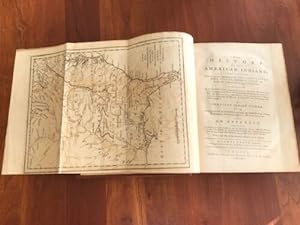About this Item
[12],464pp., plus folding map. Half title. Quarto. Modern calf in an antique style, spine ruled in gilt, gilt leather labels. A few marginal annotations in ink and pencil. Small closed tear to top of leaves Ff and Ff2 (no text affected). Occasional mild foxing throughout. Very good. James Adair (1709-1783), "one of the most colorful figures in Southern colonial history" (Clark), emigrated from Ireland to South Carolina in 1735. He was heavily involved in trading with the Indians of the Southeast, including the Catawba, Cherokee, and Chickasaw, between 1735 and 1759, and this work contains a chapter on each of these major tribes. Considered by many to be the leading authority of his time on the southeast Indians, he offers detailed descriptions of Indian customs and religion, with many observations on Indian trade and traders. A large portion of the work is devoted to Adair's twenty-three arguments by which he attempts to prove the descent of the Indians from the Lost Tribes of Israel. The map "illustrates a Southeast with the Indians safely tucked away in the interior wilderness, exactly the condition Adair's readers would have approved of" (Cumming & De Vorsey). "The citations and quotations in Adair's HISTORY are evidence of wide and serious reading. He kept up the intellectual culture of an eighteenth-century gentleman, but he lacked polish in personal demeanor. In 1768 he visited Sir William Johnson, superintendent of Indian affairs, in an unsuccessful attempt to get Johnson's endorsement of his HISTORY. Johnson was condescending, writing to General Thomas Gage (10 Dec. 1768) that Adair's "appearance may not be much in his favor. but he is certainly well acquainted with the Southern Indians, and a man of Learning tho Rusticated by 30 years residence in a Wild Country." In 1775 Adair voyaged to England to get his HISTORY published. Returning to America in the same year, he resumed trading in new surroundings in western Tennessee, where tradition has settled him with an anonymous Indian wife or mistress. He believed that Englishmen could never live in security as long as Indians were numerous and strong and that English policy should therefore be to incite the tribes to war mercilessly against each other, a precept that Adair practiced. He is notable today for his active involvement in intertribal intrigues and wars and for his record of Indian culture" - ANB. HOWES A38. PILLING, PROOF-SHEETS 18. CLARK I:28. VAIL 643. FIELD 11. JCB (3)I:2013. SERVIES 517. BELL A59. SABIN 155. GRAFF 10. CUMMING & DE VORSEY 448. ESTC T86841. REESE & OSBORN, STRUGGLE FOR NORTH AMERICA 82. ANB 1, pp.60-61. Seller Inventory # 100134
Contact seller
Report this item
![]()




